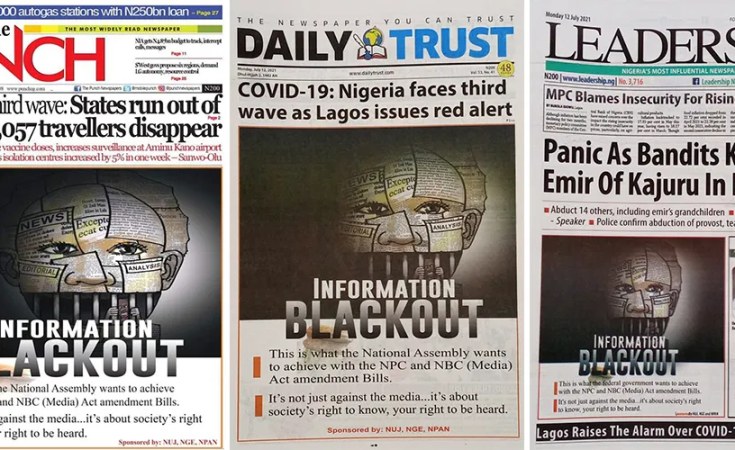Abuja — Nigerian newspapers are protesting legislation being considered in Parliament that would allow authorities to control the press. All Nigeria's national dailies on Monday had "Information Blackout" boldly printed on their front pages to raise support against the proposal.
The agreement to stage a front-page protest was reached last week during a meeting of the Nigerian Press Organization, NPO, in Lagos.
The solidarity will continue Tuesday and Wednesday with the aim of raising awareness and mobilizing public support against the bills, which would give greater powers to two regulatory bodies -- the Nigerian Press Council and the Nigerian Broadcasting Commission.
Lawmakers said the bills are intended to curb fake news. But critics said the bills would give authorities the power to hit media outlets and journalists with huge fines and give journalists up to three years in jail.
Activist supports protest
Nigerian activist and freelance writer Raphael Adebayo welcomes the dailies' protest and said the media bill is an attack on free speech.
"It is a laudable step," Adebayo said. "The media guilds in the country have realized the saliency of solidary against the common enemy that faces press freedom in Nigeria today."
The Nigerian lawmaker who initiated the bills, Olusegun Odebunmi, said the changes are not an attempt to gag the media.
Debates on the bill began amid the government's move to tighten regulations on social media.
Last month, the government suspended Twitter in Nigeria for censoring a comment by President Muhammadu Buhari. Authorities are yet to reverse this ban.
Authorities also said falsehoods promoted on such platforms could trigger violence.
Concerns are valid
The director of news at Voice of Nigeria, Ahaziah Abubakar, said the government's concerns are valid.
But Adebayo said the government is simply trying to stifle opinions that are contrary to theirs.
"There's already in existence a reviewed NBC code which continues to make life harder for people who are working with the press," Adebayo said. "Yet they want to make it even harder for them to express themselves, to express the opinion of the people and to express generally the state of things in the country."
Media sanctions have become more frequently discussed since Buhari was first elected in 2015.
Between 2017 and 2019, lawmakers considered a bill to regulate social media, and another bill proposing the death penalty for anyone promoting hate speech about the government. Both bills were suspended after public outcries.


